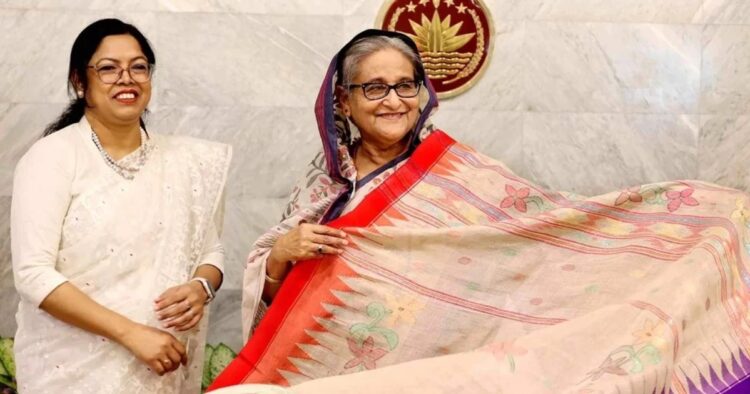Bangladesh Prime Minister Sheikh Hasina has strongly criticized the opposition Bangladesh Nationalist Party (BNP) for urging a boycott of Bharatiya products. Speaking at a gathering of her party, the Awami League, Hasina questioned why the wives of BNP leaders haven’t burned the Indian sarees they possess. She accused the BNP leaders of hypocrisy, alleging that during their time in power, they would buy sarees from India during official tours and sell them in Bangladesh.
Furthermore, Hasina denounced the BNP’s leaders for their apparent use of Bharatiya spices and other products, stating that items like garam masala, onions, garlic, and ginger should not be found in their homes if they are advocating for an Bharatiya product boycott. Her remarks come amid a growing ‘India Out’ campaign in Bangladesh, which has garnered support from some activists and opposition figures who accuse Bharat of meddling in Bangladesh’s internal affairs to maintain Hasina’s grip on power.
The recent controversy escalated when a senior BNP leader, Ruhul Rizvi, publicly discarded his Kashmiri shawl to protest against Indian products. This act of defiance highlights the deepening rift between the ruling Awami League and the opposition BNP, with tensions flaring over issues of national sovereignty and economic dependency on India.
However, despite the opposition’s calls for a boycott, there appears to be ambiguity within the BNP regarding its official stance. Sayrul Kabir Khan, a member of BNP’s media cell, admitted that while there is no official position on the boycott, some party leaders are supporting the campaign, reflecting internal divisions within the party.
Sheikh Hasina’s latest rebuke of the BNP comes against the backdrop of her recent electoral victory, securing her fifth consecutive term as Prime Minister of Bangladesh. Despite facing criticism and boycotts from the opposition, Hasina’s Awami League secured a landslide victory in the general elections, further solidifying her position as one of the world’s longest-serving female heads of government.
Hasina, the daughter of Bangladesh’s founding father Sheikh Mujibur Rahman, has been at the helm of Bangladesh’s government since 2009. Her tenure has been marked by both progress and controversy, with her government often facing accusations of authoritarianism and human rights violations. Yet, her firm stance against the BNP’s calls for an Indian product boycott underscores her commitment to maintaining strong ties with India, a key regional ally and trading partner.

















Comments